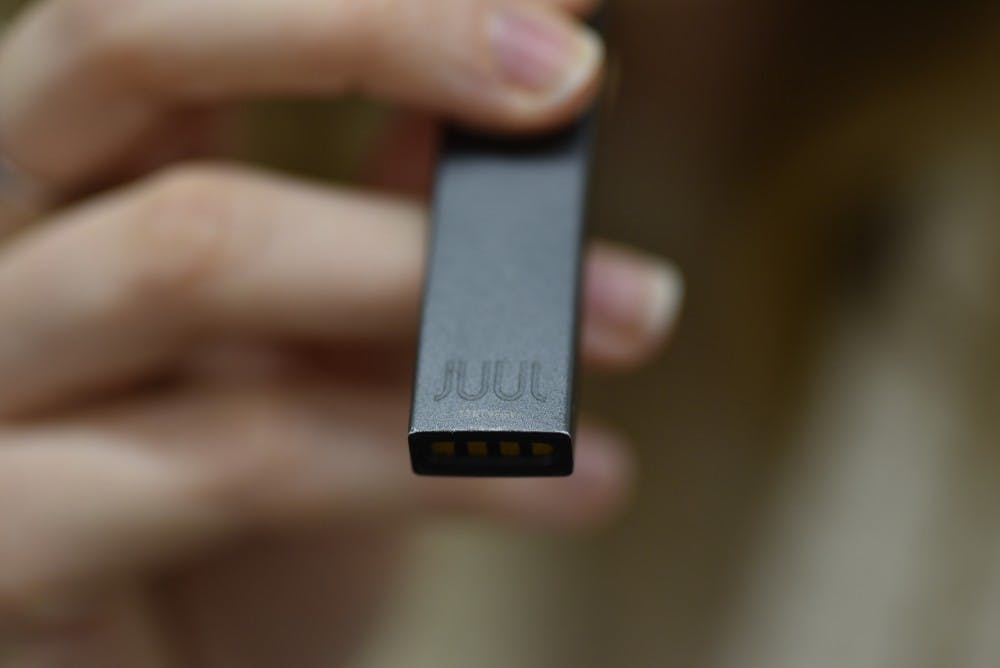Earlier this year, Virginia Gov. Ralph Northam signed into law legislation which officially raised the legal purchasing age of tobacco and vapor-related products from 18 to 21. In a state whose very origins and history are heavily intertwined with the cultivation of tobacco — tracing its earliest roots to 1611 at Jamestown — and remains one of its largest industries, this move by lawmakers in Richmond was monumental. Yet despite this, numerous inherent flaws and loopholes still exist with the Commonwealth’s strategy to address the recent upsurge in teen consumption of e-cigarettes.
Nearly a decade ago, many believed that smoking was largely in decline amongst younger Americans as the result of increased public awareness regarding the risks associated with the practice as well as sweeping regulation efforts enacted by state and federal lawmakers. However, in 2018, it was found that there had been almost a 75 percent increase in the usage e-cigarettes of amongst high schoolers in the United States from just the previous year.
This massive uptick in teen consumption of e-cigarettes can largely be attributed to the success of products such as the Juul and Sourin whose sleek design and packaging, simplicity, and abundance of flavors is especially appealing to younger consumer demographics. In 2018 alone, Juul’s annual revenue exceeded $1 billion, with the company being valued at $38 billion. For an industry which has largely taken root only over the past several years, this blockbuster success has garnered legions of loyal customers, including over three million teens, constituting almost 20 percent of all high school students nationwide, and leading FDA commissioner Scott Gottlieb, to label the recent trend as an “epidemic.”
It should be no surprise then that in 2017, the Virginia Department of Health found that at least 11.8 percent of all high school students across the Commonwealth were regular e-cigarette users, nearly double the rate of those who smoked traditional cigarettes. However, many have speculated that the actual proportion of teens in Virginia who currently vape could be substantially higher as many teens mistakenly fail to classify popular devices such as the Juul or Sourin as e-cigarettes — a misconception which can largely be attributed to a lack of awareness as well as deceptive marketing efforts led by e-cigarette companies themselves.
In many respects, the sudden popularity of these vaping devices can largely be attributed to the prevailing misconception that these items are “harmless” due to their lack of the same carcinogenic chemicals and toxins that are traditionally found in tobacco. Furthermore, vaping devices do not suffer from the same social stigma as cigarettes, with numerous public health campaigns, including those sponsored by the Virginia Departments of Education and Health, failing to even address this newfound phenomenon.
In fact, e-cigarette use actually presents an entire host of health-related complications and risks, including exposure to various toxic chemicals and substances such as, but not limited to, acrylonitrile, acrolein, diacetyl, formaldehyde and, in some cases, even lead. Furthermore, many of these products also contain dangerously high levels of nicotine, making them incredibly addictive. One Juul pod alone contains as much nicotine as an entire pack of traditional cigarettes. This is especially worrisome as research has overwhelmingly indicated that exposure to high levels of nicotine throughout adolescence can lead to the development psychiatric disorders and cognitive impairments.
For these reasons and more the Commonwealth should strive to vigorously address this ongoing public health crisis. While raising the legal purchasing age of tobacco and vapor-related products is a step in the right direction, there still remains an abundance of other strategies which should be employed in order to further curtail the increasing popularity of e-cigarettes amongst teens.
Specifically, unlike surrounding states such as Maryland, West Virginia, Delaware and North Carolina, Virginia currently does not impose an excise tax on the sale of e-cigarette devices or the products associated with them. As a result, the price of e-cigarettes is oftentimes especially appealing to younger consumers who are typically financially constrained.
Furthermore, unlike tobacco products, e-cigarettes are not subject to the same restrictions and oversight by the state. For example, there is currently no statewide limit to the number of e-cigarette units which an individual can purchase in a single transaction. As a result, large quantities of e-cigarettes can easily be purchased in bulk and then illegally redistributed to minors. Moreover, due to the lack of taxes and oversight on these items, it is very probable that they may soon become the subject of smuggling operations as is currently the case with cigarettes in Virginia.
Lastly, as alluded to earlier in this article, Virginia currently lacks a curriculum in place for educating its students on the dangers and risks associated with e-cigarette use. The Virginia Department of Education must modernize its curriculum to not only reflect this increasingly pervasive trend amongst teens but also to empower school districts and administrators with the resources necessary to appropriately respond.
Ultimately, the rapid growth and popularity of e-cigarettes amongst teens today constitutes a major threat to the health and the well-being of young Virginians. While research has yet to fully elucidate the dangers and risks associated with vaping, it is sufficient to say that these devices are something which our society can no longer afford to ignore, much less allow them to remain in the hands of minors.
Thomas Driscoll is a Viewpoint Writer for The Cavalier Daily. He can be reached at opinion@cavalierdaily.com.





